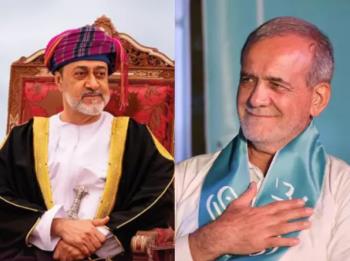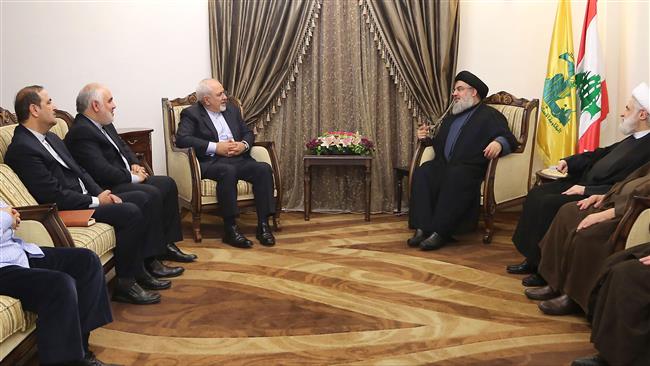Alwaght-Iran’s Foreign Minister Mohammad Javad Zarif made a crucial visit to Lebanon on Monday afternoon days after the election of Michel Aoun as the country’s president.
Aoun was voted in by Lebanon’s parliament as the new president, breaking a political impasse that has left the post empty for more than two and a half years. Lebanon’s parliament elected Aoun as president last week. The Arab nation had been without a head of state for 29 months after Michel Suleiman stepped down as president at the end of his term in May 2014. Since then, 45 sessions to elect a new leader had failed due to political infighting.
Aoun, met Zarif, who said that electing a new president is a victory for all the Lebanese, adding that Iran and Lebanon can strengthen their mutual political and economic relations.
The Iranian Foreign Minister also met his Lebanese counterpart Jebran Bassil and after the talks, the two men held a joint press conference in which they stressed the importance of strengthening the mutual ties. Zarif also held talks with Sayyed Hassan Nasrallah, the head of Lebanon's Hezbollah resistance movement, on Tuesday in Lebanese capital Beirut.
During the meeting, Foreign Minister Mohammad Javad Zarif and Nasrallah conferred on the latest political developments in Lebanon and the region. “The role played by Hezbollah as the symbol of resistance, and also by the movement’s authorities, especially [Secretary General] Sayyed Hassan Nasrallah is a source of pride, not only for Lebanon and Iran, but also for the entire Muslim world,” Zarif said during the meeting.
Zarif also held talks with Lebanon’s Parliament Speaker Nabih Berri, Caretaker Prime Minister Tammam Salam, Prime Minister-designate Saad Hariri, and a number of political and spiritual dignitaries. Zarif also met Economy Minister Alain Hakim as well as prominent Lebanese businessmen and traders.
Iran’s Foreign Minister’s meeting with Hariri has been termed as significant. “The dangers which are threatening us are the danger of the Zionist regime [of Israel] and the danger of extremism,” Zarif told reporters after a meeting with the Lebanese Prime Minister-designate Saad Hariri. He noted that the two sides also urged regional players to bridge the gaps on the political settlement of the existing crises in the region, the top Iranian diplomat said.
Lebanese Unity to Defeat Adversities
On the start of his Beirut visit, Zarif felicitated Lebanese people on the election of new President, and underlined that the country could overcome difficulties through unity.
“Despite problems that Lebanon and the region are facing with, we are confident that Lebanese people could leave behind all these difficulties by their unity and solidarity,” Zarif told reporters upon his arrival at Beirut airport
Iran's Support for Hezbollah
Iran’s continued support for the Lebanese resistance movement is meant to ensure security and stability of the whole of Lebanon. The Hezbollah resistance movement along with the Lebanese army have always worked together to maintain security and eventually solve the political and economic problems facing the country.
France and the Saudi regime have previously reneged on supply of weapons to Lebanon and therefore the Beirut authorities are willing to accept Iran’s assistance in strengthening the country’s army.
The Lebanese people are also upset by Saudi interference in the country’s internal affairs.
Riyadh-Beirut went bad early February this year when Saudi Arabia retracted a $4-billion aid pledge to Lebanon’s security forces. The aid suspension came after Beirut did not follow Riyadh’s lead and rejected calls to endorse joint anti-Iran statements at separate meetings held in Cairo and Jeddah.
Hezbollah Fighting to Secure Syria
Lebanon is suffering from the spillover of Takfiri terrorist groups in neighboring Syria. Terrorists have been active on the Lebanese areas situated close to the Syrian border. Hezbollah fighters have been assisting Syrian army forces inside Syria and have also fended off several terrorist attacks inside Lebanon.
Hezbollah chief said in October this year that the resistance movement’s fighters will remain in neighboring Syria until they achieve the final victory over foreign-sponsored Takfiri terrorists and purge the crisis-hit Arab country of extremists.
He made the remarks during an event to mark the killing of the movement's military commander, Hatem Hamade, in Syria, Seyyed Hassan Nasrallah dismissed rumors about Hezbollah forces’ withdrawing from Syria, stressing that the fighters will leave Syria only after they have defeated Takfiri terrorists there.
"Our choice of going to Syria was very well studied after observing the regional developments that began in Tunisia and reached Syria," he said, adding, "Time has revealed that the battle in Syria is aimed at making existential changes on the ground as well as to the political map of the region."



























